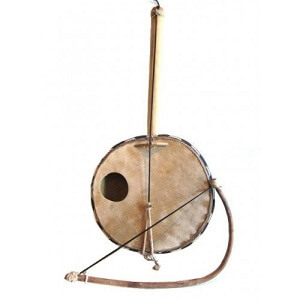Goje
 The Goje is a traditional musical instrument among the Hausa people of Nigeria. The Goje is one of the many names for a variety of one or two-stringed fiddles from West Africa, almost exclusively played by ethnic groups inhabiting the Sahel and Sudan sparsely vegetated grassland belts leading to the Sahara.
The Goje is a traditional musical instrument among the Hausa people of Nigeria. The Goje is one of the many names for a variety of one or two-stringed fiddles from West Africa, almost exclusively played by ethnic groups inhabiting the Sahel and Sudan sparsely vegetated grassland belts leading to the Sahara.
The Goje is a stringed fiddle musical instrument belonging to the stringed musical instrument family. Resembling the guitar, it is made out of lizard skin pulled over a gourd bowl, and a horse hair string suspended over the bridge. When played, it produces a multiphonic sound.
Often played as a solo instrument to accompany singing, the Goje is known by various names including Goje or Goge (Hausa, Zarma in Nigeria), gonjey (Dagomba, Gurunsi in Ghana), Ggonje, (Mamprusi, Dagomba in Ghana), Njarka (Songhay in Mali), and N’ko (Bambara, Mandinka and other Mande languages in the Sahel Regions).
The traditional use of the this instrument dates several centuries. The instrument is tied to various pre-Islamic Sahelian rituals around jinn possession, such as the Bori and Hauka traditions of the Maguzawa Hausa, Zarma, Borori, and Songhay. These instruments are held in high esteem and their use are linked to the spirit world, or as a carrier for voices aimed at or from the spirit world.